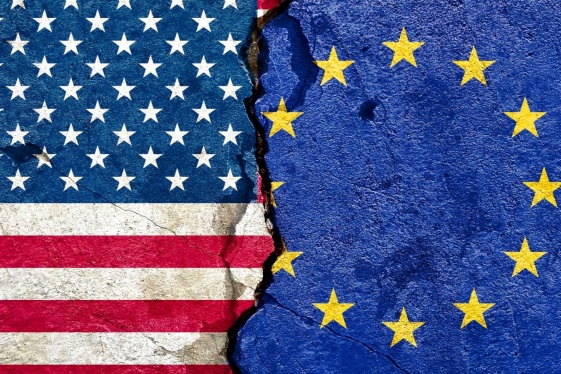

There is a deep bond - of blood, memory, and tradition - that unites millions of families in the United States with Italy. It is not just a story of past generations who emigrated; it is an identity that continues to evolve, enriched by new expressions of belonging. It is the way Sunday lunch is prepared in countless homes, the way holidays are celebrated, the pride with which people work, and the appreciation of the beauty and culture embedded in our products. And today, that bond is at risk of being seriously damaged.
I am talking about an issue that is both old and new - divisive for sure - and one that often has long-term consequences that contradict its short-term effects. Right now in Italy, the hot topic when it comes to the United States is tariffs.
For the Italian American community, this is not just a political or economic issue. It is also, and perhaps more importantly, a question of identity. Because when we talk about Made in Italy, we are not just talking about products - we’re talking about the entire Italian American community, our culture, our heritage, our place within the American soul.
A bond that lives every day
We all know the Italian American community in the United States is made up of over twenty million people. And in each of them, there’s a piece of Italy that lives on every day. It lives in the fresh mozzarella from the neighborhood deli. It is in the precise movements of a grandfather pruning grapevines in the backyard. It is in the smell of tomato sauce filling the house on Sunday morning. These are not just habits - they are living roots, acts of love, daily gestures that keep a collective story alive.
But now, all of this is at risk. Because the new American tariffs on a range of European goods - including many symbols of Made in Italy - threaten not just trade, but our daily connection to our roots.
Tariffs for us mean that a bottle of wine from Puglia, a wheel of Pecorino Romano, an artisanal panettone, or a jar of San Marzano tomatoes could end up costing twice as much. It means our trusted local restaurateur might not be able to offer those authentic flavors that make their place special. It means that instead of real Italian products, we will see more and more “imitations” with Italian-sounding names that have nothing to do with our traditions.
So let’s say it clearly: tariffs don’t just hurt Italy - they hurt our community. They hurt those who built lives in the U.S. based on the value of their origins, on respect for quality, and on the desire to pass down the authenticity of Italian culture to their children and grandchildren.
Reagan understood this well
In the 1980s, Ronald Reagan - a President who knew how to speak to many of us - put it plainly:
“Protectionism weakens the protected instead of strengthening them.”
“When someone says: Let’s impose tariffs on foreign imports, it can sound patriotic - like we’re protecting American products and jobs. And sometimes, for a short time, it works - but only briefly. What eventually happens is that domestic industries start relying on government protection in the form of high tariffs. They stop competing, and they stop innovating in management and technology, which are essential for success in global markets. And while that’s happening, something worse happens: high tariffs inevitably lead to retaliation from other countries and the start of harsh trade wars.”
It was true then, and it is even more true today. In our globalized world, where economies are deeply interconnected, closing the door does not protect - it isolates. And if trade between the U.S. and Italy is isolated, we break a value chain that’s also cultural, social, and communal.
Made in Italyi is part of our American identity
For an Italian American, buying an Italian product isn’t just a consumer choice. It is an expression of identity. It is a way of staying faithful to our roots. It is putting our grandparents’ stories, our parents’ courage, and our children’s future on the table.
Made in Italy is soft power, yes. But for us, It is also family power. It is what keeps us connected, even when we live far apart. It is what makes us feel at home anywhere in the U.S. when we find a bakery selling Altamura bread or a deli offering Felino salami.
And It is not just about nostalgia: Made in Italy is also an economic engine for the U.S. Think about the thousands of Italian American restaurants, grocery stores, distributors, importers, and culinary consultants. When access to authentic products shrinks, the impact is felt across the local American economy. And that should matter to everyone - not just those with Italian last names.
The Italian American community has always played an active role in American society - contributing with our work, our culture, our art, and our entrepreneurial spirit to its growth and prosperity. Today, we can continue doing so - for example, by sharing our voices with local media, elected officials, and community organizations.
We can also choose more consciously to support genuine Made in Italy. I believe now is the time to reject Italian Sounding products and cheap imitations. Let’s reward those who import transparently, invest in quality, and honor tradition. Every purchase we make is a declaration of loyalty to our roots.
And let’s keep teaching our children what’s behind an Italian product. Let’s tell the stories, teach the recipes, and pass down the values. Let’s make sure the new generations of Italian Americans grow up to be proud and conscious stewards of our heritage.
Tariffs can be an opportunity - or us to move from passive observers to active protagonists. Because we are millions. And together, we can make a difference.
Defending Made in Italy is not just an economic issue - it is an act of love for who we are. It is a way of telling the world that identity cannot be taxed - it must be celebrated. That quality cannot be blocked with a tariff - it must be protected with recognition. And that the bond between Italy and the United States is not a geopolitical fact - it is a living, daily story. Our story.
From the days of Reagan to today, the world has changed.
But one thing hasn’t: the value of our roots- and our right and duty to defend them.
You may be interested
-
Banks: fewer and fewer branches across Italy
The trend of banks "disengaging" from Italian territory continues unabated. Nearly half o...
-
Beyond trade: Italy’s investment imbalance wi...
As Prime Minister Meloni prepares to discuss tariffs with President Trump in Washington, f...
-
Create Value, Invest with Us: new opportuniti...
The "Create Value, Invest with Us" section is now online on the Agency of State Property’s...
-
Giro d’Italia and the Bike Economy. The excel...
2,100 million euros. That is the estimated value the Giro d’Italia generates for local ter...
-
Growth of consumer credit in Italy and its im...
Consumer credit is growing in Italy, with the volume of loans seeing a new increase of 5.3...
-
How Italian businesses are feeling the strain...
The real-world impact of the trade tensions sparked by the current U.S. administration is...
-
Italian design leads Europe in revenue and em...
Italian design continues to rank first in Europe for both revenue and workforce share. Ita...
-
Italian economy: Italy between recovery and u...
In recent weeks, Italy’s economy has sent very important signals. For the Italian American...










